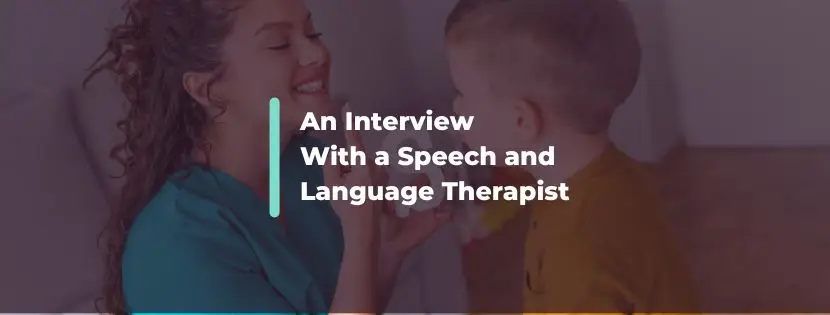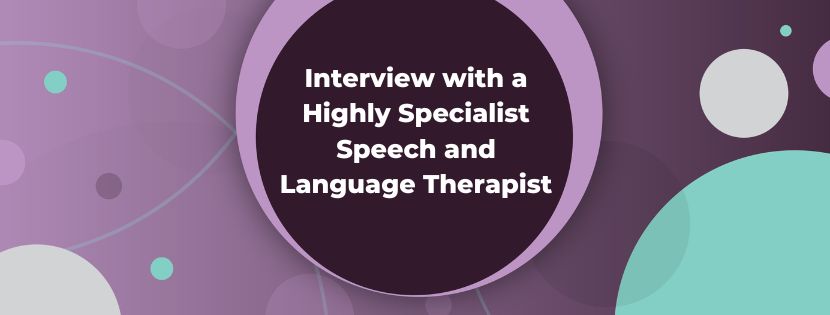The Art of Communication: Insights from a Speech and Language Expert
08 Jan, 20251-2 minutes
In this blog, you will learn:
- How to become a Specialist Speech and Language Therapist.
- How Speech and Language Therapists collaborate with other healthcare professionals.
- How to overcome challenges in speech and language therapy.
- Essential skills for a Speech and Language Therapist.
- Where the latest Speech and Language Therapist jobs are and how to apply for them.
Curious to know what it’s really like behind the scenes as a Specialist Speech and Language Therapist? We recently got the chance to speak to Zahrah, a Specialist Speech and Language Therapist, who has worked in the industry for 8 years.
With a foundation in BSc Speech and Language Therapy from City University of London, Zahrah’s journey began with placements that sparked an interest for language development.
With over a decade of experience working with children and young people across nurseries, tuition centres and schools, Zahrah shares what it really takes to succeed in this rewarding role.
Tell us about your academic journey to becoming a Specialist Speech and Language Therapist.
I completed my degree in BSc Speech and Language Therapist at City University of London. During my degree, I had various placements which drew me closer to having a specific interest in the development of language over speech development.
Upon graduation, I worked for a private clinic in Sloane Square and during this time I was able to express my interest in autism, social communication and language disorders. Working specifically with clients who required support in these areas, led me to specialise in language.
There are not always specific courses that you are required to complete to specialise in an area, however, gaining experience and continuing your professional development helps to expand your knowledge further.
Can you tell us about your career journey as a Specialist Speech and Language Therapist? What initially drew you to this role?
I am a Paediatric Speech and Language Therapist and have worked with children and young people since the age of 16. This has been in various settings such as nurseries, play centres, tuition centres and schools.
Working with children was my passion from early on and I enjoyed studying the English language. This combined built curiosity in how language develops in toddlers and after learning about the role of a Speech and Language Therapist, there was no other job I could see myself doing.
What are the most challenging parts of your role and how do you overcome them?
The most challenging part of my role can be working with students online who struggle to engage or trust new people. From my previous experience working with teenagers, I have found that the best way to overcome this is to work on building a connection with the student before you begin to target any goals.
This can mean spending a few sessions to get to know them, finding out their interests, their favourite activities as well as things that they don’t like. I have also found opening up a space for them to ask you questions helps them build trust. They get to see you as a person too rather than just a professional.
What does a typical day look like for you? What are your main responsibilities?
A typical day will be logging on and answering any pending emails to begin with. I typically will see anywhere between 2-6 students in the mornings. My current students are aged between 5-23, so my day can vary.
I often work on vocabulary building and following instructions in one session to work on conversational skills with my older students.
My main responsibilities include keeping schools and parents updated on their child's progress, this will be through case notes, phone calls and end of block summary reports.
I conduct assessments for new clients as well as annual review reports for students with Education Health Care Plans.
What skills do you believe are essential for a Specialist Speech and Language Therapist and why?
Being flexible is important as a Specialist Speech and Language Therapist as you may have a plan for the session, however, the student may not be able to engage in the tasks you had planned for that day.
Students may attend therapy tired, upset, hungry or unwell. This can impact their attention and it is okay to switch tasks or abandon them completely on those days.
Do you collaborate with other healthcare professionals?
Yes, I often collaborate with Occupational Therapists, Educational Psychologists, Mental Health Support Workers and Counsellors. Collaborating and working as a team is essential in our role to gain a deeper understanding of the student’s current abilities and struggles.
Students who present with language difficulties often struggle with poor mental health, therefore it is important to liaise with other professionals to ensure you are providing the best support possible.
What advice would you give to aspiring Speech and Language Therapists entering the field today?
Your personality matters, don’t try to hide or change it to fit in. Know that it is okay to not know everything, none of us do.
If you’re not sure of an answer, families always appreciate you being honest and letting them know you’ll find out and get back to them.
Do you have any professional goals?
I previously provided clinical supervision to newly qualified therapists so I would like to further develop my supervision skills and offer private supervision to other Speech and Language Therapists.
What do you do to ensure you have the right work-life balance?
It can be tricky to switch off from work some evenings, however, going for a walk after a day of therapy really helps to shut off. I try to do this near water, I find that the silence and calm of the waves refreshes my mind.
I am also mindful of how many sessions a day works best for me to prevent burnout.
I also ensure that I take breaks during the term so that I can come back refreshed like my students.
Is there anything else you would like to share about the role of a Specialist Speech and Language Therapist?
Despite the challenges, it is a highly rewarding job. Seeing your students progress over the sessions and hearing the difference it makes to their day to day lives is an amazing feeling.
When you find an area that you enjoy and work with those clients specifically, it no longer feels like ‘work’.
Speech & Language Therapist jobs
If you’re searching for your next Speech & Language Therapist job, why not take a look at the latest vacancies, or simply upload your CV to be notified when a relevant position becomes available.
Recruit Speech & Language Therapists
As healthcare recruitment specialists, we support local authorities and private sector businesses nationwide with their temporary, interim and permanent recruitment needs.
If you’re struggling to fill a Speech & Language Therapist vacancy, why not get in touch with our healthcare specialist, Natalie Boaler on 01772 954200 to see how we can help?
Share your experience
Every individual brings a unique set of experiences, thoughts, and insights to the table. We believe in giving a voice to a community of professionals to inspire positive change and champion reform in the healthcare sector.
If you work in the healthcare sector and would like to share your own personal and professional experiences, we’d love to hear from you. Perhaps you have a different perspective, could offer a fresh angle, or want to challenge assumptions.
Simply reach out to our Head of Content, Nicole Sherwood, to discuss a collaboration which makes your voice count.
Who is Spencer Clarke Group?
Established in 2017, we’re a vibrant and progressive recruitment agency based in the heart of the North West.
We continually reimagine the recruitment process to challenge convention and defy expectations; from creating a better recruitment experience to remodelling employee engagement, we thrive off doing things differently and turning heads along the way.
We operate in two sectors:
In eleven specialisms:
Healthcare, Social Care & Nursing
Corporate Functions & Business Support





